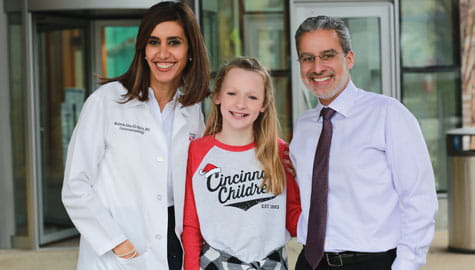Back in the Spotlight
Specialists in our Pancreas Care Center work together to help children like Attie pursue their passions
Attie stands on one leg, her other lifted and pointed behind her. She raises her arms, her hands gently curving. “This position is called attitude,” she says. Her face, with its sprinkling of cinnamon freckles, lights up.
Jenny, Attie’s mom, smiles. “You couldn’t have picked a better dance position to show,” she tells her daughter. “Your attitude is exactly why you’re standing here today.”
It was just a year ago that Attie traveled to Cincinnati Children’s from Oklahoma to meet with specialists about a condition she’d lived with since she was 4 years old—pancreatitis, a chronically inflamed pancreas.
It’s a debilitatingly painful condition that results in repeated hospitalizations. And, because the pancreas aids in digestion and makes insulin to control blood sugar, patients like Attie live with restricted diets and are at risk for developing diabetes over time.
“Pancreatitis controls her life,” Jenny says. “It interrupts everything—school, activities, hanging out with friends. She had to watch her friends and siblings enjoy foods she couldn’t have or go out while she was in the hospital. It was so hard.”
Traveling to Cincinnati for the Best Care
When she was in sixth grade, Attie was hospitalized five times for pain, and she kept getting sicker.
After finishing a dance recital one afternoon, Attie told Jenny she didn’t feel well. “We took her to the hospital, but didn’t realize how sick she was,” Jenny says. Her voice catches. “Her pancreas was full of stones and her liver had stopped working.”
Jenny closes her eyes. “We were terrified. Her pancreatitis had never affected other organs. She needed help immediately.”
That’s when they traveled to our Pancreas Care Center, housed in our No. 1 ranked Division of Gastroenterology, Hepatology and Nutrition.
Pioneering Hope
Maisam Abu-El-Haija, MD, sits at her desk, leaning back slightly in her chair. A self-described Type A personality, her expression is both warm and extremely focused. As the medical director—and co-founder—of our Pancreas Care Center, she is passionate about helping kids like Attie get their lives back.
“Pancreatic disorders have long been neglected in children. Starting the Pancreas Care Center was a dream of mine,” Dr. Abu-El-Haija says, eyes shining. “And now, we’re one of only two pediatric centers of excellence recognized by the National Pancreas Foundation. I’m incredibly proud of the dedicated team we assembled to serve children like Attie. It means everything to me.”
For Attie and her family, that meant she was finally in the right place. Together, they met with Dr. Abu-El-Haija and Jaimie Nathan, MD, surgical director of the center, to see if Attie would benefit from a procedure called total pancreatectomy with islet autotransplantation (TPIAT).
TPIAT involves removing the pancreas to cure the debilitating pain of chronic pancreatitis. Then, the islet cells—which produce insulin—are taken out of the organ and injected into the liver, where they can begin to work again.
“We’re one of only a few institutions that offer this surgery to children,” says Dr. Nathan. “And for the patients who receive it, the results can be life changing. These kids get their childhoods back. It’s astonishing to see how much their lives improve.”
Getting Attie Back on Stage
After meeting with our specialists, Attie and her family decided to go ahead with the procedure.
“We were scared, yet hopeful,” Jenny says. “Attie could get back to her life, her dancing. We liked how that sounded.”
The surgery lasted 16 hours. “The first thing she did when she could get out of bed was a ballet step,” Jenny says, smiling. “She had 20 cords attached to her and couldn’t speak, but she could dance.”
That never-give-up attitude drove Attie’s recovery. Within five-and-a-half weeks, she returned to Oklahoma, in time for the last dance competition of the season. She competed with her feeding tube hidden inside her costume.
Now, one year post-surgery, Attie’s islet cells are working like they should. And she’s no longer in incapacitating pain.
“She looks so much healthier than I’ve ever seen her,” Jenny says. “She’s taller, her hair has thickened, and she has color in her cheeks.”
But to Attie, being able to dance again is what makes it all worth it. “I was cast in the lead role in my school’s production of The Nutcracker,” Attie says, beaming. “Cincinnati Children’s gave me my life back. I will always be grateful for that.”
To learn more and support our work within the Division of Gastroenterology, Hepatology and Nutrition, please contact James Cleetus at james.cleetus@cchmc.org or 513-636-1166.






